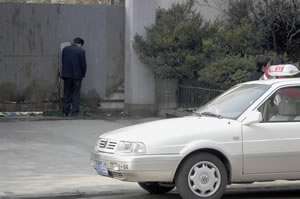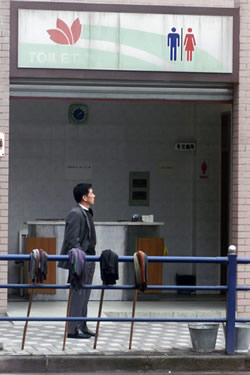Shanghai Star. 2002-11-14

SHANGHAINESE have a new route to fortune, that is investing in public washrooms.
On November 5, Li Hongfang, a 45-year-old woman and laid-off worker, became the first to strike gold. She won the bid and became the manager of a star-graded public washroom on Huaihai Zhonglu.
This marks the launch of the pilot reform programme to privatize public washrooms and breaks the monopoly of the public sanitation bureau.
Cheng Jianzhong, an official from the city appearance management bureau in Luwan District, said the transfer fee was 200,000 yuan (US$24,158) with a term of 10 years. The recipient can keep all income without turning in any to the public sanitation bureau.
The most seductive aspect of the policy is that each year the government will allocate 32,000 yuan (US$3,865) as a subsidy for public causes and an extra amount for renovation every four years.
'Where can I wash my hands?'

Despite this innovation in the management of public utilities, for most tourists, especially those from other provinces and foreign countries, the total position of public washrooms in Shanghai is still unsatisfactory.
Many tourists complain that they are always confronted with the embarrassment of finding no public washrooms when nature calls.
Statistics collected at the end of 2000 show there are 1,089 public washrooms, 212 mobile toilets and 566 enterprises' washrooms open to the public in downtown Shanghai.
Compared with other cosmopolitan cities in the world, Shanghai doesn't lag behind in the terms of the quantity of public washrooms, but they can be hard to find nevertheless.
The location of some public washrooms is often quite inconvenient in Shanghai.
Some of them were built decades ago in formerly densely populated areas. Due to the fabulously rapid development of Shanghai, these residential communities were pulled down and some new commercial hubs were set up in new locations. As a result, the old public washrooms became relatively useless.
Opening-up drive
To make up the gap between the great demand from the public and the insufficient supply of public washrooms, various enterprises and department stores have been called upon to open their restrooms to the public. At the moment, however, these guidelines are not binding regulations.
"We hope these working units will take the image of Shanghai into full consideration and make their contribution to the modernization drive of our city," said Xu Zhiping, an official from the public sanitation bureau of Shanghai.
Some enterprises face difficulties in opening their toilets to the public, such as management and security problem and the cost of daily maintenance.
"I don't think enterprises should bear the responsibilities of providing restrooms to people," said Yao Mingwu, an employee of an unidentified enterprise.
"Since it is a public utility, the government should beef up their efforts to build enough public washrooms to serve society," said Yao.
"We once caught a thief who entered our factory on the pretext of using our restrooms. It opens a potential security loophole for businesses."
It was reported that one old man in his seventies lacking the money to enter the public restrooms and barred from nearby factories had no alternative but to soil himself. This was a shameful event for the city.
Dissatisfaction
There is a great gap between Shanghai and other metropolises in terms of public washroom resources and the sense of public service.
"We've built and renovated a certain amount of star-graded public restrooms with touch-free facilities. Some of our recipients can even provide services to the public in English. But the cost and maintenance is too high while their charges are the same as others. To be frank, many restrooms are just too far above the standard," Xu, the pubic sanitation bureau official, said.
Some large-scale constructions are deficient in public services because the designers didn't take the needs of the public into full consideration. The absence of public washrooms in the stations of Metro Line One once stirred great dissatisfaction among local people.
"It wasn't the technology but the backward service ethic that hindered us from building sanitation facilities. We have teamed up with the Metro company to solve the washroom difficulties by adding enough mobile toilets in each station," Xu said.
Fortunately, the municipal government has been aware of the washroom difficulties and promised to redouble their efforts to solve it within three years.
Maybe a suggestion given by a foreign teacher named Frank P. DeFina is quite feasible to Shanghai: "There should be more small public washrooms, as space is scarce in Shanghai, possibly with a very small fee like 0.2 yuan but not those horrible anti-sanitary, anti-aesthetic and smelly pay-portable-washrooms that are spreading around the world."
